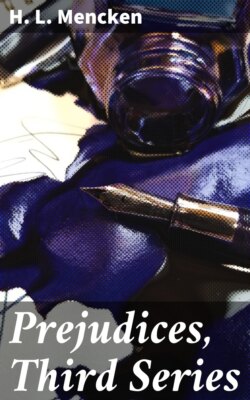Prejudices, Third Series

Реклама. ООО «ЛитРес», ИНН: 7719571260.
Оглавление
H. L. Mencken. Prejudices, Third Series
Prejudices, Third Series
Table of Contents
I. ON BEING AN AMERICAN. 1
2
3
4
II. HUNEKER: A MEMORY
III. FOOTNOTE ON CRITICISM
IV. DAS KAPITAL
V. AD IMAGINEM DEI CREAVIT ILLUM. 1. The Life of Man
2. The Anthropomorphic Delusion
3. Meditation on Meditation
4. Man and His Soul
5. Coda
VI. STAR-SPANGLED MEN
VII. THE POET AND HIS ART. I
II
III
IV
VIII. FIVE MEN AT RANDOM. 1. Abraham Lincoln
2. Paul Elmer More
3. Madison Cawein
4. Frank Harris
5. Havelock Ellis
IX. THE NATURE OF LIBERTY
X. THE NOVEL
XI. THE FORWARD-LOOKER
XII. MEMORIAL SERVICE
XIII. EDUCATION. I
II
III
IV
XIV. TYPES OF MEN. 1. The Romantic
2. The Skeptic
3. The Believer
4. The Worker
5. The Physician
6. The Scientist
7. The Business Man
8. The King
9. The Average Man
10. The Truth-Seeker
11. The Pacifist
12. The Relative
XV. THE DISMAL SCIENCE
XVI. MATTERS OF STATE. 1. Le Contrat Social
2. On Minorities
XVII. REFLECTIONS ON THE DRAMA
XVIII. ADVICE TO YOUNG MEN. 1. To Him that Hath
2. The Venerable Examined
3. Duty
Martyrs
5. The Disabled Veteran
6. Patriotism
XIX. SUITE AMÉRICANE. 1. Aspiration
2. Virtue
3. Eminence
Отрывок из книги
H. L. Mencken
Published by Good Press, 2021
.....
The multiplication of such taboos is obviously not characteristic of a culture that is moving from a lower plane to a higher—that is, of a culture still in the full glow of its youth. It is a sign, rather, of a culture that is slipping downhill—one that is reverting to the most primitive standards and ways of thought. The taboo, indeed, is the trade-mark of the savage, and wherever it exists it is a relentless and effective enemy of civilized enlightenment. The savage is the most meticulously moral of men; there is scarcely an act of his daily life that is not conditioned by unyielding prohibitions and obligations, most of them logically unintelligible. The mob-man, a savage set amid civilization, cherishes a code of the same draconian kind. He believes firmly that right and wrong are immovable things—that they have an actual and unchangeable existence, and that any challenge of them, by word or act, is a crime against society. And with the concept of wrongness, of course, he always confuses the concept of mere differentness—to him the two are indistinguishable. Anything strange is to be combatted; it is of the Devil. The mob-man cannot grasp ideas in their native nakedness. They must be dramatized and personalized for him, and provided with either white wings or forked tails. All discussion of them, to interest him, must take the form of a pursuit and scotching of demons. He cannot think of a heresy without thinking of a heretic to be caught, condemned, and burned.
The Fathers of the Republic, I am convinced, had a great deal more prevision than even their most romantic worshipers give them credit for. They not only sought to create a governmental machine that would be safe from attack without; they also sought to create one that would be safe from attack within. They invented very ingenious devices for holding the mob in check, for protecting the national polity against its transient and illogical rages, for securing the determination of all the larger matters of state to a concealed but none the less real aristocracy. Nothing could have been further from the intent of Washington, Hamilton and even Jefferson than that the official doctrines of the nation, in the year 1922, should be identical with the nonsense heard in the chautauqua, from the evangelical pulpit, and on the stump. But Jackson and his merry men broke through the barbed wires thus so carefully strung, and ever since 1825 vox populi has been the true voice of the nation. To-day there is no longer any question of statesmanship, in any real sense, in our politics. The only way to success in American public life lies in flattering and kowtowing to the mob. A candidate for office, even the highest, must either adopt its current manias en bloc, or convince it hypocritically that he has done so, while cherishing reservations in petto. The result is that only two sorts of men stand any chance whatever of getting into actual control of affairs—first, glorified mob-men who genuinely believe what the mob believes, and secondly, shrewd fellows who are willing to make any sacrifice of conviction and self-respect in order to hold their jobs. One finds perfect examples of the first class in Jackson and Bryan. One finds hundreds of specimens of the second among the politicians who got themselves so affectingly converted to Prohibition, and who voted and blubbered for it with flasks in their pockets. Even on the highest planes our politics seems to be incurable mountebankish. The same Senators who raised such raucous alarms against the League of Nations voted for the Disarmament Treaty—a far more obvious surrender to English hegemony. And the same Senators who pleaded for the League on the ground that its failure would break the heart of the world were eloquently against the treaty. The few men who maintained a consistent course in both cases, voting either for or against both League and treaty, were denounced by the newspapers as deliberate marplots, and found their constituents rising against them. To such an extent had the public become accustomed to buncombe that simple honesty was incomprehensible to it, and hence abhorrent!
.....